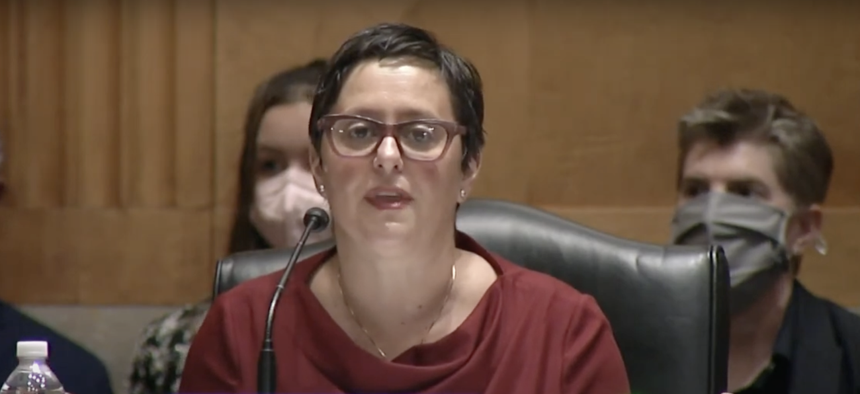
Cathy Harris, a Democrat, was nominated to the Merit Systems Protection Board by President Biden. C-SPAN/Screengrab GovExec
Court allows Trump to fire appeals board member, which could ‘trap in legal limbo’ feds fighting terminations and RIFs
Appeals court has paused a lower court ruling blocking the firing one-third of MSPB's central board, creating a crisis for the agency.
President Trump can once again fire a key appointee who hears appeals of firings and suspensions of federal employees, putting the board on which she sits at risk of losing its functionality as the administration is pushing out large swaths of the federal workforce.
Cathy Harris, a Democrat nominated to the Merit Systems Protection Board by President Biden, was fired by Trump last month but quickly won reinstatement from a district judge. On Friday, a panel on the U.S. Court of Appeals for the D.C. Circuit in a 2-1 decision paused the lower court’s decision and said Trump could fire Harris.
The decision also applied to Gwynne Wilcox, a member of the National Labor Relations Board who Trump had fired and a district court also reinstated.
If Harris is removed, MSPB would be left without a quorum. From 2017 to 2022, the board also lacked a quorum, which created a 3,500-case backlog that was only just recently eliminated. Due to an interim final rule established that same year, MSPB can conduct some actions without a quorum, though it cannot issue final decisions appealed to its central board.
Zac Kurz, an MSPB spokesman, confirmed Friday evening that that the central board no longer has a quorum. While regional administrative judges can still issue initial rulings, the central board can no longer hear appeals of those rulings.
Harris earlier this month ordered the temporary reinstatement of thousands of Agriculture Department probationary employees who were fired by the Trump administration. Her term is not set to expire until 2028.
Harris represents one-third of the federal employee appeals board that has experienced a surge in cases as a result of the president’s mass firings and layoffs of civil servants. Ray Limon, another Democrat, saw his term expire earlier this year. That means if Trump re-fires Harris, only Henry Kerner, a Republican, will remain on the board.
No more than two board members of the MSPB can be from the same political party.
In a hearing earlier this month, the Trump administration argued that the president should be able to remove members of the MSPB and NLRB at will.
“The ‘for cause’ removal restrictions for members of the NLRB and MSPB unconstitutionally infringe on the president’s core Article II authority to supervise principal officers who wield his executive power on his behalf,” the government’s lawyer argued.
Judges Karen Henderson and Justin Walker, in separate consenting opinions, agreed with the government’s arguments.
“Of course, only the president (along with the vice president) is elected by the entire nation,” Henderson wrote. “At minimum, this factor does not weigh in Harris’ and Wilcox’s favor.”
The decision breaks with the precedent in 1935 Supreme Court case Humphrey's Executor v. United States, which unanimously found that the president does not hold the power to remove officials on quasi-judicial administrative bodies except as directly authorized by Congress. Judge Justin Walker, a Trump appointee, suggested MSPB provided only intra-branch dispute resolution and therefore was not a quasi-judicial agency.
In a dissenting opinion, Judge Patricia Millett said her colleagues “rewrite controlling Supreme Court precedent and ignore the binding communities for everyone.” She called the stay “an unprecedented and, in my view, wholly unwarranted use of this court’s stay power.” She added the majority opinion amounted to a “revolution in the law” that would “trap in legal limbo millions of employees and employers whom the law says must go to these boards for the resolution of their employment disputes.”
Earlier this month, the same trio of judges allowed for Special Counsel Hampton Dellinger to be removed while the court heard the Trump administration's appeal of a similar district judge ruling that blocked Trump’s firing of the special counsel. Following that decision, Dellinger decided to drop his lawsuit.
During oral arguments on the case, Harris’ attorney said lawmakers had hoped to protect officials like her client from arbitrary and politically motivated removals.
“Congress, which is the people’s representatives, have enacted a law…to say that these types of neutral arbiters have a measure of protection [from removal] because otherwise they can’t decide cases free of fear or favor,” Harris’ lawyer argued.
Sean Michael Newhouse contributed to this report.







